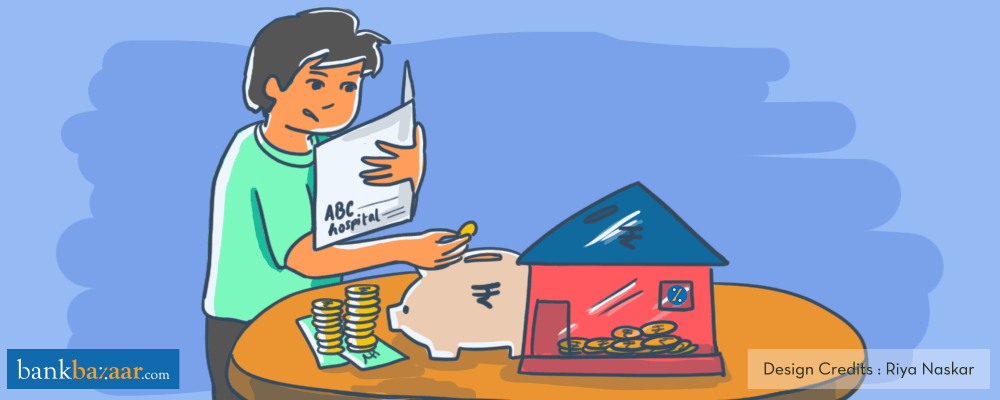We’re already in the second quarter of the financial year and you should ideally be done with tax planning for the year. Here’s how you can save a little more besides the usual 80C.
Most people think that they have limited means of saving tax. Actually, there are quite a few options out there. Yes, we’ve all heard of 80C deductions. Here’s a list of lesser-known tax deductions that most people aren’t aware of. You’re very welcome!
Additional Reading: How To Score Maximum Tax Deductions On Charitable Donations
Super Senior Citizens: Medical Expenses If They’re Uninsured
If you are a very senior citizen (aged 80 years or more) and have not purchased any Health Insurance, you can avail deduction for medical expenditure incurred up to Rs. 30,000 per financial year. However, please note the total deduction that can be availed for Health Insurance, preventive checkup, and medical expenses cannot exceed Rs. 30,000.
Let’s explain this to you with an example. You’re a very senior citizen but your wife is not. You don’t purchase Health Insurance for yourself but purchase one for your spouse. The deduction for your medical expenses, Health Insurance of your spouse (or children), and health checkup is limited to Rs. 30,000.
Similarly, if either of your parents is a very senior citizen and uninsured, you can avail deduction for medical expenses incurred up to Rs. 30,000 per financial year. It must be noted that medical expenses are eligible for deduction only for the parent who is a very senior citizen. As mentioned above, the total deduction for premium payment, health checkup, and medical expenses is limited to Rs. 30,000 per financial year.
Savings Account Interest
Interest income of up to Rs. 10,000 from savings bank deposits qualifies for a deduction under section 80TTA. Despite all taxpayers earning this interest every year, many tend to overlook this deduction. Section 80TTA of the Income Tax Act deals with deduction with respect to interest income from your savings bank account. Section 80TTA does not apply to interest income from Fixed Deposits.
Deduction u/s 80TTA is available to an individual assessee and also a Hindu Undivided Family (HUF). The deduction is allowed for interest from savings account held with a bank, co-operative society or a post office. The maximum deduction an individual or HUF can claim under this section cannot exceed Rs. 10,000.
Tax Deduction For Disabilities
Individuals with 40% or more of specified disabilities under the Income Tax Act are entitled to a deduction of Rs. 75,000 under section 80U. A deduction of Rs. 1,25,000 is available if the disability is severe (80% or more). The important thing to note here is that the disability has to be certified by a government hospital.
Also, a deduction of Rs. 75,000 is available under section 80DD for a taxpayer who is taking care of a disabled dependent. In this case, the latter has to be entirely dependent on the taxpayer. The tax relief will go up to Rs. 1,25,000 in case the disability is over 80%.
Deduction On Interest Paid On A Personal Loan Taken To Purchase A House
Taxpayers wrongly believe that if they have taken Home Loans from institutional sources, only then are they entitled to deduction U/S 24 on interest paid. However, that is not true. The interest paid on Personal Loans from an acquaintance is definitely eligible for this tax concession. It is important to note that the lender has to issue a certificate to the effect that the taxpayer has paid the specified amount of interest.
Additional Reading: How To Make Your Salary Tax Efficient
Deduction On Rent Paid If You Are Not Availing HRA
This should apply to quite a few people. This is applicable to those who are self-employed or are not availing House Rent Allowance (HRA). You can avail deduction under Section 80GG. However, there are a few conditions to be met. They are as follows:
– You are self-employed or salaried
– You have not received HRA at any time during the year for which you are claiming 80GG
– You or your spouse or your minor child or HUF of which you are a member do not own any residential accommodation at the place where you currently reside, perform duties of office, or employment or carry on business or profession.
You will be required to file Form 10BA with details of payment of rent.
You, your spouse or minor children shall not own residential accommodation at the place of your employment. Additionally, you must not have availed any HRA during the entire financial year. You should not have any self-occupied residential premise in any other place.
Additional Reading: Reasons You Can Get An Income Tax Notice & Steps To Follow
There you have it! We hope this helps. You can also save a good chunk of change when you choose a loan or Credit Card that suits your needs. We can help. Go ahead and explore.